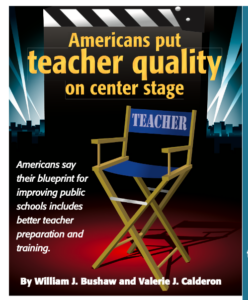In their annual poll of the public’s attitude toward public education, what prompted the well-respected PDK (Phi Delta Kappa) association’s new question about the purpose of education?
And how is it the question asks about the main goal of a public school education while the website and discussion shifts the conversation to the purpose of education?
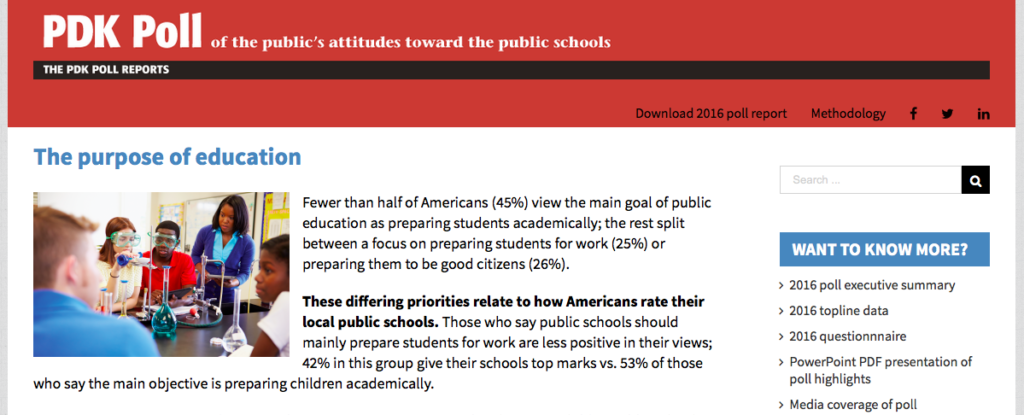 Just semantics? Maybe. But, did you know that one definition of semantics is “a deliberate distortion or twisting of meaning, as in advertising, propaganda, etc.”?
Just semantics? Maybe. But, did you know that one definition of semantics is “a deliberate distortion or twisting of meaning, as in advertising, propaganda, etc.”?
Purpose is the reason for which something is done.
Goal is an aim or desired result.
And because struggles in the education reform war continually demonstrate that words are determining outcomes of our battles, we should pay close attention. Words have become the weapon of choice against an unsuspecting public.
The words of reform sold us a perceived need to reform a whole system. The reality is that we needed to only reform the schools in our country that needed re-forming — high-poverty, low-performing schools. We had already identified them before the 1980’s.
The truth? Test-based accountability methods changed nothing. And school choice only reshuffled the deck.
But let’s look at the question of the hour…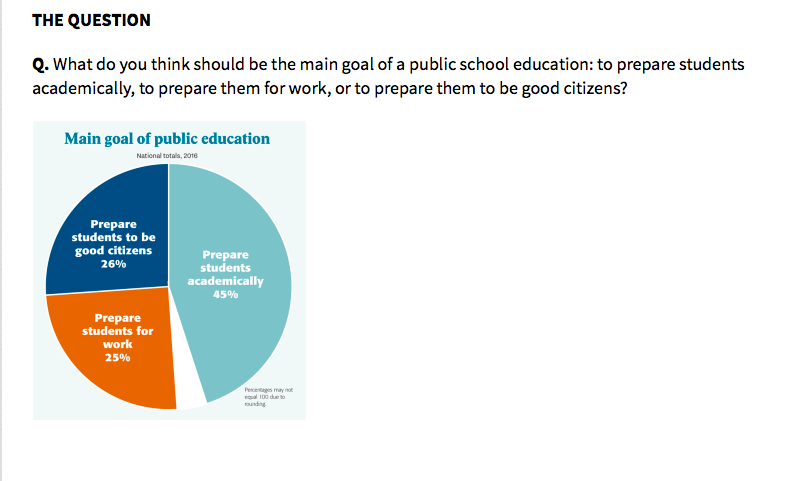 ….and look at what one long-time. …long, long time… education-and-the-economy expert, Mr. Marc Tucker, had to say.
….and look at what one long-time. …long, long time… education-and-the-economy expert, Mr. Marc Tucker, had to say.
This would be a good guess since the marketing plan appears to be focusing on promoting the purpose of public education as a workforce pipeline. America’s choice?
Our expert is guessing? Let me guess; he knows something we don’t. After all, he is a long-time occupant of the D.C. inner circle, father of the Education/Labor Market System, and an international systems expert. He knows what is going down.
Tucker believes that parents should be choosing BOTH prepare students academically and for work…always beating his education-and-the-economy drum. But why not choose “to be good citizens”?
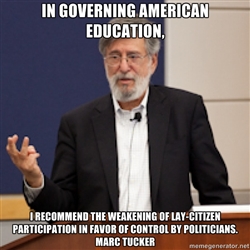
This is one more topic where my opinion differs from Marc Tucker’s.
I confess, there is just something about Mr. Tucker’s narrow-mindedness (and his continuing position of power) that makes me want to write. So, here’s my view of this question….
Only 26 percent of respondents in this PDK poll think that preparing students to be good citizens is the most important goal of a public school education. Only!?! Yes, that should be alarming.
Let me ask you; what does it take to be a good citizen?
I thought we needed to learn to read so that we could inform ourselves. I thought we needed to be able to do the math, including understanding statistics, so that we would be less likely to be fooled.
I thought we needed to learn to gather our own facts and think critically because that’s what we need to do in order to be the ultimate authority (the check and balance) in maintaining a representative form of government.
I thought that the pursuit of happiness was a fundamental America value and it meant that our personal interests were important.
I thought that being a good citizen included not being a drag to society, which means being prepared to work and doing the best you can to support yourself.
Academics and work?
Yes, they are part of being a good citizen. But, there is much more to producing an educated electorate than what is being offered in the narrow curriculum of way too many disadvantaged districts —a situation worsened by our outcome-based reforms. Mr. Tucker created and pushed this test-based theory from the get-go.
Tucker has been and continues to be a go-to for The Education Oligarchy.
Yet, Tucker goes on to blame the United States for the damage done to vocational education. — But it’s the STANDARDS STUPID! — Look in the mirror, oh creator of the outcome-based system.
How many times has Mr. Tucker’s publications directed those in power to “start first with academic standards”? Have they ever faced the facts?
The focus on standards narrowed the curriculum.
The focus on standards was deadening to instruction.
The focus on standards almost killed the idea that students need to apply what they learn to real world experiences.
Wake up, America! It’s time to fight for a broad, balanced curriculum, not a narrow set of standards.
We are a nation at risk and the enemy is masked as an expert.
And since when has the purpose of our public education system been to produce already trained workers for private industry? Granted, one purpose is to ensure a solid educational foundation upon which to build. BUT,….
Since when is the goal of public schools to run kids through the workforce development pipeline and pour them directly into jobs? Of course we all need a job but test-and-sort is a recipe for unhappiness.
And, is it a coincidence that editorials are appearing in my local newspaper parroting the same “purpose of education” as the new PDK poll and Mr. Tucker?
“Accelerating talent pipelines is a deliberate effort to prepare our kids, and adults, faster than traditional education pathways, for high paying jobs we know exist today.
How do we build talent pipelines? We embrace three fundamental realities changing our world.
First, we acknowledge the purpose of education is to get a good job and improve our income.
Second, we recognize companies are rapidly shifting their focus to skills and not diplomas for hiring.
Third, we recognize industry is the primary customer of our education system.
Finally, the solution demands we empower industry to influence education outcomes.“
NO! This is NOT the purpose of OUR free system of public schools as envisioned by our founding fathers. This is a takeover of our public education system by THE PEOPLE WHO OWN THE WORLD (that includes information systems).
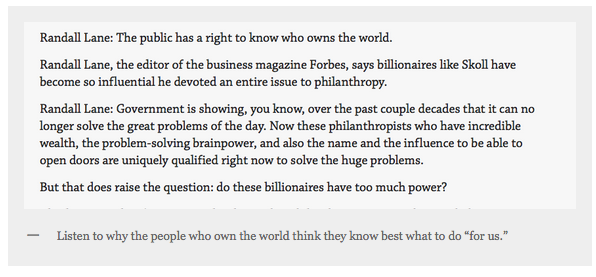
Update 12/7/19: This was off of a 60 Minutes interview called the Giving Pledge. It appears to no longer be available without a subscription. (Sorry!)
Please don’t let the public schools become just another one of their information delivery systems and their publicly funded training services. Is this the expectation parents have for their children’s schools?
When those who run the show begin giving us the illusion that public opinion is driving education policy, we should be very, very concerned that the PDK annual poll has a new driver. We — and our representatives — will hear what they say is public opinion. ….. Think about it.
For the first time since the inception of the PDK/Gallup poll on education in 1969, Langer Research Associates did the polling instead of Gallup. That in itself might not mean much. But, how much do we know about this relatively new firm other than they did work for ABC News and Bloomberg? And this particular question, about the purpose of education, is straight out of the standard-bearers playbook….?…
The Reality of the Education Reform War
“They” control the language, develop the conversation, and convince the public that their way is the right way.
When you have high-powered marketing firms pushing your agenda, your message pops up everywhere. It’s no coincidence.
Thankfully, Gallup (on their own without PDK) continued their tradition of asking parents about their satisfaction with their own schools.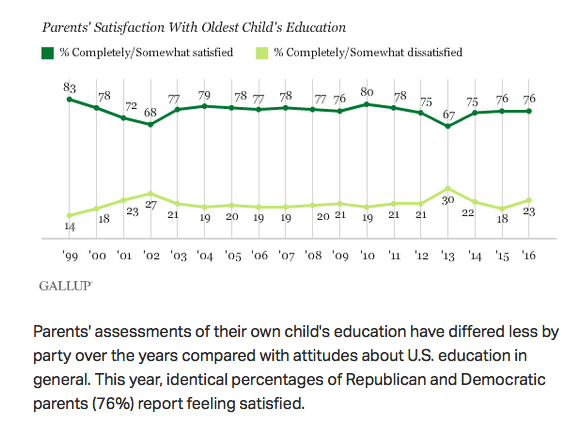 With 76 percent of parents satisfied with their child’s education, isn’t it time we asked; what are we reforming? And how is it we are changing the whole system and not focusing on what needs fixing (23%)?
With 76 percent of parents satisfied with their child’s education, isn’t it time we asked; what are we reforming? And how is it we are changing the whole system and not focusing on what needs fixing (23%)?
Ask Mr. Tucker. He was the go-to education expert back when the standards,testing, accountability movement took off and apparently he continues to be a power player. He’s one national driver who hasn’t changed.
Do you know who is driving education reform in your state?
If charters and “choice” are high on your state’s list of laws to pass (or have already been passed), good chance ALEC (American Legislative Exchange Council) is involved. The wild west is certainly in their pocket and the conversation about the purpose of education has been going on for some time here.
In Idaho (2013), our Governor’s Task Force on Improving Education stated that …
“the higher purpose inherent in education is obvious.”
But it is not obvious in their plan. Their words mean nothing. Their focus continues to be on a narrowed, test-based curriculum with the same old outcome-based accountability that never held anyone accountable. This is state-led?
If this is called “state-led” under the dictates of the new federal education law (Every Student Succeeds Act, ESSA), it is no different from the fed-led dictates of No Child Left Behind. The outcome is the same. The law is driving us towards the development of a corporate-controlled, labor development system dubbed public education.
Are we sure this is the direction we want public education to go?
Are we sold on the purpose of education as workforce development (and military recruitment)? Mission accomplished?

